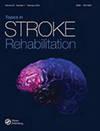Non-pharmacological interventions to treat mood disturbances post-stroke: a systematic review.
IF 2.2
4区 医学
Q1 REHABILITATION
引用次数: 0
Abstract
BACKGROUND Stroke survivors face high rates of depression, anxiety, and pseudobulbar affect. Clinicians report lack of clarity on effective non-pharmacological interventions due to uncertainty about treatment options as barriers to evidence-based treatment. No systematic review has investigated the effectiveness of non-pharmacological interventions on the conditions of depression, anxiety, and pseudo-bulbar affect. OBJECTIVES The aim of this study was to evaluate the effectiveness of non-pharmacological interventions on the outcomes of depression, anxiety, and pseudobulbar affect in post-stroke individuals. METHODS Following the Preferred Reporting Items of Systematic Reviews and Meta-Analyses (PRISMA) guidelines, we searched databases Medline, Scopus, Cumulative Index to Nursing and Allied Health Literature (CINAHL) and PsycINFO for randomized controlled trials in English, within 2012-2023, evaluating the effect of a non-pharmacological intervention on depression, anxiety, and/or pseudobulbar affect. Two researchers screened titles, abstracts, and full texts. One researcher extracted data and assessed risk of bias. Data were synthesized narratively. RESULTS Forty-two studies were included. Intervention types included education (n = 9), psychological therapy (n = 8), and physical exercise (n = 8). Intervention types reporting positive outcomes for depression were psychological therapy (n = 6), physical exercise (n = 3) and robot-assisted therapy (n = 3). Intervention types effective in improving anxiety were physical exercise (n = 2), psychological therapy (n = 3) and multi-modal therapy approaches (n = 2). No studies explored the impact on pseudobulbar affect. CONCLUSION Non-pharmacological interventions may be effective in improving mood in stroke survivors. Robot-assisted therapy and physical exercise were seen to improve multiple outcome measures. Patient education should be delivered alongside rehabilitation and directed to both stroke-survivor and caregiver.治疗中风后情绪障碍的非药物干预:系统综述。
背景脑卒中幸存者的抑郁、焦虑和假性脑卒中发生率很高。临床医生表示,由于治疗方案的不确定性,有效的非药物干预措施缺乏明确性,这是循证治疗的障碍。本研究旨在评估非药物干预措施对脑卒中后患者抑郁、焦虑和假性脑卒中的疗效。方法根据系统综述和荟萃分析首选报告项目(PRISMA)指南,我们检索了 Medline、Scopus、Cumulative Index to Nursing and Allied Health Literature (CINAHL) 和 PsycINFO 等数据库,寻找 2012-2023 年间评估非药物干预对抑郁、焦虑和/或假性脑卒中影响的英文随机对照试验。两名研究人员筛选了标题、摘要和全文。一名研究人员提取数据并评估偏倚风险。结果共纳入 42 项研究。干预类型包括教育(9 项)、心理治疗(8 项)和体育锻炼(8 项)。对抑郁症有积极疗效的干预类型包括心理疗法(6 项)、体育锻炼(3 项)和机器人辅助疗法(3 项)。对改善焦虑有效的干预类型有体育锻炼(n = 2)、心理治疗(n = 3)和多模式治疗方法(n = 2)。结论非药物干预可有效改善中风幸存者的情绪。机器人辅助治疗和体育锻炼可改善多种结果指标。患者教育应与康复同时进行,并同时面向中风幸存者和照护者。
本文章由计算机程序翻译,如有差异,请以英文原文为准。
求助全文
约1分钟内获得全文
求助全文
来源期刊

Topics in Stroke Rehabilitation
医学-康复医学
CiteScore
5.10
自引率
4.50%
发文量
57
审稿时长
6-12 weeks
期刊介绍:
Topics in Stroke Rehabilitation is the leading journal devoted to the study and dissemination of interdisciplinary, evidence-based, clinical information related to stroke rehabilitation. The journal’s scope covers physical medicine and rehabilitation, neurology, neurorehabilitation, neural engineering and therapeutics, neuropsychology and cognition, optimization of the rehabilitation system, robotics and biomechanics, pain management, nursing, physical therapy, cardiopulmonary fitness, mobility, occupational therapy, speech pathology and communication. There is a particular focus on stroke recovery, improving rehabilitation outcomes, quality of life, activities of daily living, motor control, family and care givers, and community issues.
The journal reviews and reports clinical practices, clinical trials, state-of-the-art concepts, and new developments in stroke research and patient care. Both primary research papers, reviews of existing literature, and invited editorials, are included. Sharply-focused, single-issue topics, and the latest in clinical research, provide in-depth knowledge.
 求助内容:
求助内容: 应助结果提醒方式:
应助结果提醒方式:


